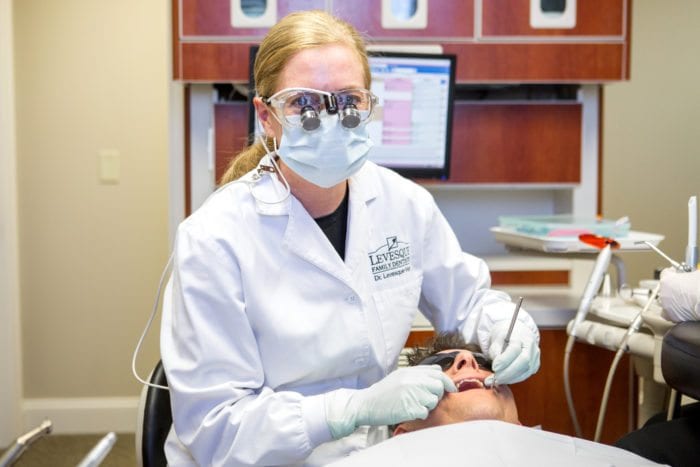Preventive Dental Care An Overview
At Levesque Dentistry in Nashua, NH, you can expect the highest level of care and advanced treatment options. We recommend visiting us at least twice a year to maintain great oral health.
If you have gum disease, it may be recommended that you visit the dentist three or more times a year to maintain optimal dental health and avoid permanent damage.



Importance of Preventative Care
Preventative dental care is essential for oral health and provides the foundation of your smile. You must maintain it both at home and with regular visits to our office.
Preventative dental care prevents problems before they start. When you come to the office, we perform a thorough oral exam. With our advanced training and diagnostic imaging, we can often detect issues in their early stages that you may overlook.
While diligently brushing and flossing at home is essential, you should still come into the office for regular dental cleanings. We have specialized tools that can reach the nooks and crannies you can’t reach. Without these cleanings, plaque and tartar build up in these areas, increasing the risk of tooth decay and gum disease even if you do everything right.
Detecting problems early saves you money and avoids more intensive dental procedures. Regular dental appointments are often covered by insurance. They cost less out of pocket than more extensive procedures, too. These procedures can trigger dental anxiety and mean you’ll have to spend a lot more time in the dental chair.
Taking care of your oral health is important for your overall health. Your mouth is the gateway to the rest of your body. In particular, gum disease impacts the rest of your body. The bacteria from gum disease are linked to heart problems, diabetes, and other serious conditions. Keeping your mouth healthy lessens your chances of these issues.
Diet and Oral Health
Your diet plays a bigger part in your oral health than you may realize. Some foods are good for your smile, while others you should particularly avoid if you want your smile to stay at its best.
Good Foods for Oral Health
Calcium is one of the most vital nutrients for your smile. It helps remineralize the protective tooth enamel on the outside of the tooth. Foods like dairy products and leafy greens are good sources of this. Look into foods fortified with Vitamin D, as this improves calcium absorption. Sunlight is another good source of Vitamin D.
For gum health, you want Vitamin C. It promotes healing and supports healthy tissue and blood vessels. Foods like citrus fruits, peppers, and broccoli are good sources of this.
Fresh, fibrous fruits and vegetables are like natural toothbrushes for your teeth. They reach all the nooks and crannies of the mouth, dislodging food particles from between the teeth. They also require a lot of chewing to break down, promoting saliva production.
Saliva is one of the most important components of oral health. It neutralizes acids and washes away bacteria and food particles from your smile. You should also drink a lot of water for this reason. Tap water is often fortified with fluoride, which helps strengthen enamel and prevent cavities.
Foods to Avoid
Sugar is one of the top enemies of your smile. Bacteria feed on sugar, releasing an acidic byproduct. This eats through the tooth enamel and causes cavities and decay. Hard candies consistently release sugar in your mouth as they break down, while chewy candy and dried fruits stick to your teeth, making sugar stick around longer.
Acid is another issue. It increases the rate at which tooth enamel erodes. Things like soda and too many citrus products are high in acids. Soda is especially harmful because it contains a high amount of sugar and acid.
While salty snacks may seem safe, they can be high in sugar as well. Chips easily fracture and get bits stuck between your teeth, and crackers are broken down and form a kind of paste that can stick to your teeth. When starches and carbohydrates break down, they break down into sugars, making them harmful to your teeth.
